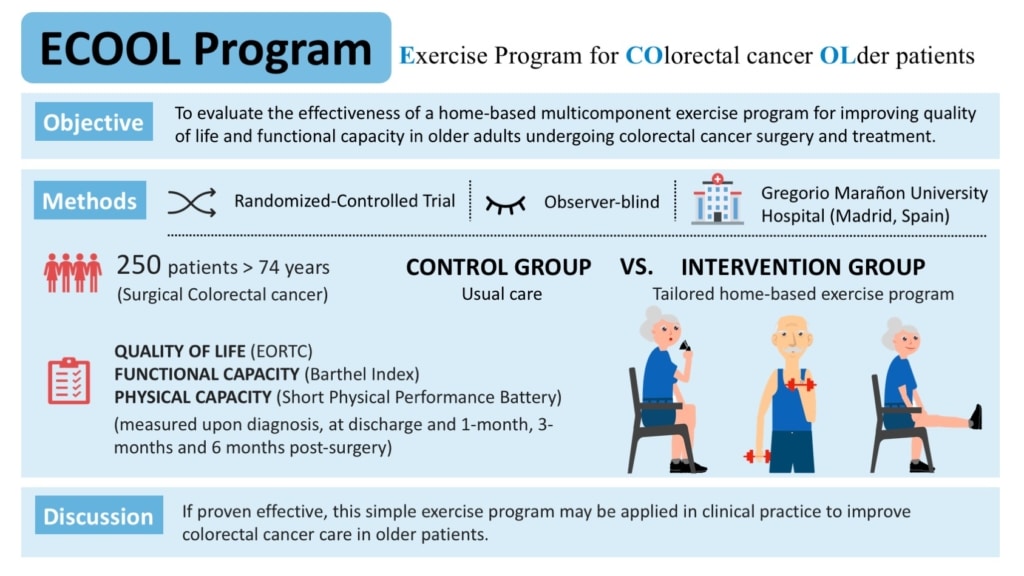
BRIEF DESCRIPTION OF THE AUTHORS:
Angela Macias Valle
PhD student in Physical Activity and Sport Sciences, Universidad Politécnica de Madrid, Spain.
Colm Mac Eochagain
Fellow in Geriatric Oncology
St James’ Hospital, Dublin, Ireland
BACKGROUND
Surgery and treatment for colorectal cancer (CRC) in the elderly patient increases the risk of developing post-operative complications, loss of functional independence, and worsening health-related quality of life (HRQoL). There is a lack of high-quality randomized controlled trials evaluating the potential benefit of exercise as a countermeasure. The primary aim of the ongoing ECOOL study is to evaluate the effectiveness of a home-based multicomponent exercise program for improving HRQoL and functional capacity in older adults undergoing CRC surgery and treatment.
We spoke with the principal author of this important study, to discuss the study’s design, objectives, and the implications it might have for the treatment of colorectal cancer in the elderly population.

QUESTIONS:
What was the main inspiration for your focus on exercise and its potential benefits for elderly colorectal cancer patients?
It is known that colorectal cancer (CRC) is one of the most prevalent cancers worldwide, that a considerable amount of new diagnoses are made on older adults and that both physical and functional capacity after CRC surgery can be permanently affected,especially in the elderly. Considering all this, the fact that there is a lack of studies involving older adults and that in our center – the Gregorio Marañon University Hospital (Madrid, Spain) – more than a hundred patients over the age of 75 years old with a colorectal neoplasm (and a high malignancy suspicion) go through surgery per year, it seemed appropriate to design a randomized controlled trial to study if a personalized exercise intervention could lead to a reduction of this physical decline and an improvement in quality of life.
Can you tell us about the recruitment process for the study participants?
All patients over the age of 75 years old with confirmed CRC diagnosis and included in the surgical waiting list are referred to the geriatrics consultation by the colorectal team of our centre and, then, offered participation. After the geriatrics consultation, in which a comprehensive geriatric assessment (CGA) is done by a nurse practitioner and a geriatrician, most patients are aware of the importance of staying physically active to preserve independence, especially within the perioperative period. However, the cancer diagnosis and the numerous perioperative medical visits raise some concerns among patients (and/or relatives) regarding the need of adding further visits to the hospital because of the study. Thus, we clarify that our visits will coincide with their existing medical appointments, minimizing additional transfers to the hospital.
Why did you choose to use a home-based exercise program as opposed to in-person sessions or group exercises?
Our team chose introducing home-based exercise sessions given the possible obstacles that older adults may find coming to the hospital (such as mobility constraints, limited availability of caregivers that can assure transfers to the hospital, time limitations, etc) and their frequent desire to stay away from the hospital as much as possible. We thought that all these factors could decrease the recruitment process and hinder their participation in the exercise programs. As well, we think that home-based exercise programs offer greater flexibility and may be more sustainable in the long run because they can integrate seamlessly into daily life, making it easier for them to maintain regular exercise habits over time.
Could you elaborate on why telephone supervision was chosen for the study, and what benefits this approach offers?
We chose weekly telephone supervision for three main reasons. First, a weekly call allows us to adapt the exercise prescriptions to the patients’ current physical function and tolerance, which is especially relevant at the early post-surgical period and during systemic cancer treatment, in which side effects can arise. Second, due to the patients’ generally limited exercise experience and the risk of sedentary behavior during cancer treatment, we believe that a weekly revision offers them close support and encouragement (which is relevant considering that our aim is to educate and boost self-efficacy for an active lifestyle). Lastly, a weekly call helps us monitor patient’s exercise adherence, which is vital for prescription and for conducting a per-protocol study analysis.
How did you ensure adherence to the exercise program given that the age group is likely to have a number of other medical conditions or limitations?
Considering that the median age of the patients we assess is 82-83 years, it is true that it is often hard to confront their comorbidities, geriatric syndromes and treatment side effects with exercise due to the symptoms they carry with them (such as dyspnea, fatigue, hand-foot syndrome, etc). However, the program´s advantage lies in its tailored nature, which means that it’s adjusted to the patients overall condition and continuously updating itself (through the pre-established weekly telephone calls and the in-person revisions). This approach enables us to adjust it whenever changes in their conditions are observed. And, of course, in especially complex patients we can rely on our multidisciplinary team – which is integrated by a geriatrician, a geriatrics nurse practitioner, the surgical team and me – for tips, doubts or any kind of assistance that may be needed.
How do you hope the ECOOL program might change clinical practice or influence patient outcomes in the future?
We designed this study for a real-world clinical setting, so we expect that – if proven effective – this exercise program will be easily applied in clinical practice. It’s worth noting that to implement it, neither a specific physical space nor stationary equipment are required. This avoids frequent barriers that we normally encounter in our daily practice, such as not having a gym available among the hospital’s facilities. Furthermore, the exercise specialist can coordinate the program remotely, allowing resource-sharing across different centers. And, of course, we hope that this program boosts the development of collaboration programs between surgical and geriatrics services to improve the management of older adults with cancer and a need of surgery.
What advice would you give to healthcare practitioners seeking to integrate exercise programs into the treatment of their elderly CRC patients?
The first advice I would give them is to truly believe that exercise can make a difference, especially in older adults. It is crucial to genuinely believe that these interventions can change our patient’s outcomes to be able to integrate them in our daily practice. Second, I would advice them to consider the addition of an exercise specialist to their team, as this investment is likely to yield valuable returns. And lastly, I would recommend them to try and arrange not only multidisciplinary meetings, but also multidisciplinary consults: in our centre we realized that whenever the program was presented to the patient with the geriatrician, the nurse practitioner and the exercise specialist, the information got through in a much smoother way and patients were more encouraged to join the study.
What message would you like to convey to our readers about the potential of exercise in improving the lives of elderly cancer patients?
Facing cancer is a significant challenge, especially in advanced stages of life. Although it might seem counterintuitive, exercise holds immense potential for improving the lives of elderly cancer patients if it is tailored to their individual needs and medical conditions. By integrating physical activity into their daily routines, elderly individuals can experience not only enhanced physical function but also emotional well-being, reduced treatment-related fatigue, increased resilience, and a better overall quality of life during their cancer journey.
Reference:
Macías-Valle, A., Rodríguez-López, C., González-Senac, N.M. et al. Exercise effects on functional capacity and quality of life in older patients with colorectal cancer: study protocol for the ECOOL randomized controlled trial. BMC Geriatr 23, 314 (2023). https://doi.org/10.1186/s12877-023-04026-6


